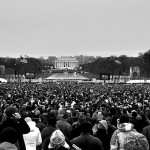Over-caffeinated hysteria forms the backdrop of the Presidency of Donald Trump.
At first, the hysteria seemed the inevitable aftermath of a particularly nasty and at times vitriolic political campaign. With two such dislikable and polarizing candidates, a winter of discontent was coming no matter who became the 45th President of the United States.
But the range and intensity of the outrage seems to be growing every morning, and in a manner asymmetric with past elections.
The asymmetry invites further reflection.
It seems to me that the range is boundless because Hillary Clinton’s loss wasn’t just a political defeat. It was a radical contradiction of the progressives’ worldview convictions.
The postnationalist corporations – a designation which includes celebrities, the media, multinational corporations, and various international agencies – are predicated upon a globalism built on technology that seeks to remove all boundaries, particularly of a moral nature; on the other hand, President Trump has clearly defined boundaries to his vision for America, and upholds the historic position that as President, his prime responsibility should be to his country: ‘America first’.
President Trump’s stances are problematic for politicians and institutions around the globe that have been thinning borders of all sorts for a generation. As the lead actor on the international stage, the multinationalists recognize that the United States’ lead will force the political class of other countries to change. A Brexit-like effect will require them to demonstrate a similar patriotism and priority of care for their own citizens, not just the good of the wealthy multinationals that live in every country.
‘Trickle down’ multinational economics and ‘open tap’ immigration policies aren’t working for Middle America, or the ‘first world’ for that matter.
Instead of a localized earthquake that shakes American politics like the Tea Party, the reaction to Trump is a global tsunami of the expressive individualism that forms the civil religion of the global elite. And because it is an establishment rebellion, it comes not from the mouths of the ordinary people of middle America, but those of the good and the great, or in the debauched equivalents of our day, the rich and powerful celebrities, the media, and the CEOs of multinational corporations.
It is perhaps appropriate that Starbucks has capitalized on the feeling to advertise its internationalist and ‘borderless’ bona fides, because it is serving up the antithesis of the Tea Party movement.
Let’s call it the Fairly Traded Coffee Party.
The defeat of the technocratic, postnationalist establishment
It seems irrelevant to them that some of President Trump’s policies sound a lot like those of Bernie Sanders, whose stances were wildly popular with many in the Democrat ranks. It is irrelevant because the Fairly Traded Coffee Party is not a popular revolt, it is an organized establishment pushback manipulating the causes of the various identity groups of its ‘anti-establishment’ base to foment insurrection against their common enemy.
However much she was disliked, Hillary Clinton represented continuity with the consensus that existed across political party lines. That movement didn’t need a leader with policies. It simply needed a likable figurehead. It had that in Barack Obama, just as it has one now in Canada in the avatar that is Justin Trudeau.
The consensus upon which these figureheads govern exist on a myriad of faith commitments of the technocratic elites. But taken as a whole, they relate to the hopeful transhumanist and posthumanist agenda to change humanity fundamentally.
President Obama was a perfect leader for them. His ‘hope’ and ‘change’ were vague slogans. While the slogans resonated with the needs of the rust belt and America’s heartland, the same voters that Trump has just captured, it became clear that Obama’s policies of hope and change were transnationalist policies more in tune with the agenda of the UN, Silicon Valley, the Ivy League, and the European technocratic elite than with jobs for middle America.
The ‘change’ the coastal elites had in view, which President Obama delivered on, was an intensification of the transformations of human nature that had been taking place in evolutionary biology and research institutes at least since C.S. Lewis identified them in 1943 in The Abolition of Man. With respect to sexuality and the family, it had a transhumanist impulse; with respect to the environment, it was posthumanist.
[I will discuss both transhumanism and posthumanism in coming blog entries]To both the transhumanist and posthumanist movements, the deeply defined social relationships and implications of a Biblical norm for sex, marriage, family, church, school, business, community, and nation – the very things that made America great – were the obstacles it was managing to eradicate at an extraordinary rate across the globe.Trump’s promise to restore, strengthen and defend the boundaries around these things by putting ‘America first’ is a strike at their ‘abolition of man’.
All the coffee in Starbucks won’t wake his opponents from that living nightmare.
And the rage is served hot every morning, individualized to the customer’s antinomian taste.











